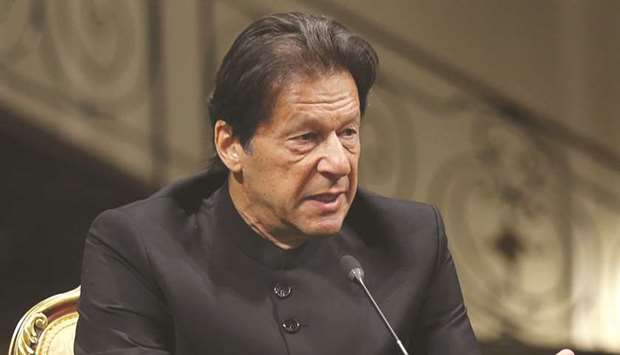While political temperatures in parliament have somewhat lowered in the past week over debate on the national budget, after the initial rumpus in the National Assembly and Senate, it is certainly on the rise outside the legislature.
Jamiat Ulema-e-Islam – Fazlur (JUI-F) chief Maulana Fazlur Rehman has finally announced the date for much-awaited opposition’s All Parties Conference (APC) for tomorrow (Wednesday, June 26), to chalk out a plan for an anti-government movement and the proposed Islamabad lockdown.
Now it depends on Prime Minister Imran Khan and his team to handle the situation with “a carrot or a stick”.
With some high-profile reshuffle in the establishment, many see this development as politically significant.
Pakistan is facing some of the most serious economic challenges currently and, in the last 10 months, the government has been unable to provide relief to the people.
There has been an increase in prices of goods and services, and gas and electricity tariffs have been raised, which the ruling Pakistan Tehreek-e-Insaf (PTI) and Prime Minister Khan blame on the previous governments.
He has also constituted a high-powered commission to investigate foreign loans taken during the past 10 years and how they were used, but the things did not look good on the ground.
The announcement about the APC date was made at a critical time.
Pakistan Peoples Party (PPP) chairman Bilawal Bhutto Zardari recently made a hard-hitting speech in Nawabshah on the birth anniversary of slain prime minister Benazir Bhutto, and vowed to overthrow the government.
On the other hand, Pakistan Muslim League – Nawaz (PML-N) leader Maryam Nawaz looked in a defiant mood with her first formal press conference in quite some time, and surprised many with her criticism of the government, the establishment, and in clear dissent against her own party president Shehbaz Sharif.
This also indicated that “all is not well” in the PML-N.
These two developments have further increased the political heat in an already uncertain situation, and it will be a real test for the prime minister and Interior Minister Brigadier (retired) Ejaz Shah.
How things will shape up in the next one or two months would be of political significance.
Opposition sources said that the APC would not only release a “declaration”, but also short-term and long-term strategies before the final “march on Islamabad”.
One has to wait and see whether the APC would be converted into any formal grand opposition alliance or constitute a committee for the movement.
The APC has been called a few days before the debate on budget concludes and the finance bill put to vote in the assembly.
The conference will also work out a strategy on whether to get the budget passed or to block it.
At present, the government may not face much difficulty in getting it passed, particularly after prime minister personally engaged all the coalition parties and accepted their respective demands, including giving one ministry each to the Muttahida Qaumi Movement – Pakistan (MQM-P) and the Pakistan Muslim League – Quaid-e-Azam (PML-Q).
However, he is still finding some difficulties in handling the six-point demand of the Baluchistan National Party – Mengal (BNP-M).
The opposition’s only hope to block the budget depends on division within the PTI-led ruling coalition.
Rehman called the APC after taking all the opposition leaders into confidence, including former prime minister Nawaz Sharif, who is currently serving seven-year imprisonment at Kot Lakhpat jail.
The BNP-M is still undecided about attending the APC, but the Rehman did hold a meeting with its leader, Sardar Akhtar Mengal, a few days ago and the latter is said to have put certain conditions for his party’s support.
Political temperatures rose after the opposition staged a protest during the budget speech in the presence of Prime Minister Khan, who displayed frustration and issued directive to his party’s members of the National Assembly (MNAs) not to allow Leader of the Opposition Shehbaz Sharif to speak.
The situation further aggravated after former president Asif Ali Zardari was arrested by the National Accountability Bureau (NAB), and National Assembly Speaker Asad Qaiser came under pressure, reportedly from the prime minister, not to issue a production order for Zardari and PML-N leader Khwaja Saad Rafiq.
Later, the premier softened his stance on the advice of some PTI leaders, and the government and the opposition reached an understanding that no one would create rumpus during the speech of any member, whether from the government or the opposition.
However, the production order of two MNAs from the tribal areas, who belong to the Pashtun Tahafuz Movement (PTM) – Mohsin Dawar and Ali Wazir – were not issued.
The opposition did not raise a fuss over this, except for Bhutto Zardari.
It is unclear whether the JUI-F would invite the PTM to the APC, as the two sides have political differences, and the Supreme Court has taken up a petition of the JUI-F’s candidate who was defeated by Dawar in the 2018 elections.
The APC is also being held at a time when elections in the tribal areas, which were earlier postponed, would be held on July 21, and former president Zardari has expressed his reservations over the presence of army personnel within the polling stations.
Those who will attend the APC include a high-powered delegation from the PPP, led by Bhutto Zardari, from the PML-N led by Shehbaz Sharif and including Maryam Nawaz, the Jamaat-e-Islami (JI)’s Ameer Sirajul Haq, the Awami National Party (ANP)’s Asfandyar Wali, the National Party’s Hasil Bizenjo.

Prime Minister Khan: personally engaged the coalition parties to ensure the budget would be passed.
